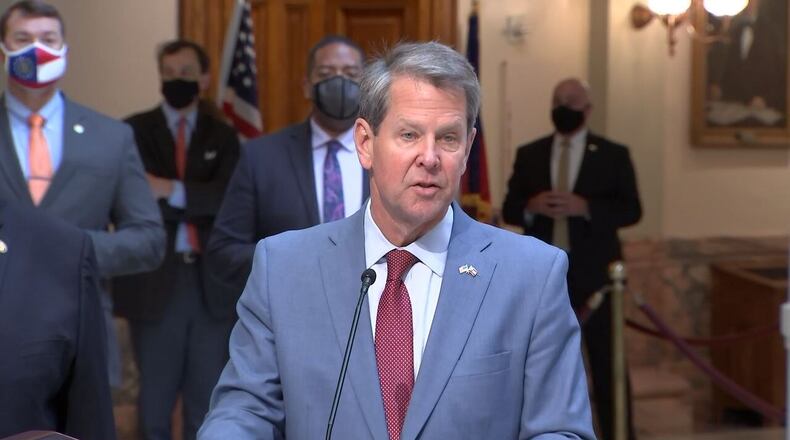A new poll out Thursday suggests economic support — such as direct cash payments — and health care are Georgians’ top priorities for spending the $4.8 billion in federal COVID-19 relief money the state is receiving.
Committees appointed by Gov. Brian Kemp are going to review applications for spending the money in three categories: expanding high-speed internet service throughout the state, water and sewer projects, and measures to help individuals and businesses affected by the COVID-19 pandemic.
Georgia law allows Kemp to make the final decision.
However, the University of Georgia Survey Research Center polled about 1,000 registered voters for the left-leaning Georgia Budget and Policy Institute think tank in late July to find out how they think the money should be spent.
The poll was weighted toward Democrats, but in many cases, the priorities were the same, no matter the party.
Both Republicans and Democrats said economic support for individuals and health care should be the top priorities for spending the federal money. Republicans made infrastructure projects — on things such as roads and bridges — their third priority, while Democrats ranked education spending No. 3.
Expanding broadband in rural Georgia was fairly low on the priority list for both. In fact, more Republicans in the poll said the state should give the money back to the federal government than fund expansion of high-speed internet service.
Caitlin Highland, the institute’s director of strategic communications, said the federal COVID-19 relief funding provides state leaders with “a unique opportunity to invest in our state’s people and help our communities recover and thrive.”
“Although the state currently plans to focus on one-time investments in broadband, sewer and water infrastructure, as well as immediate economic impact,” she said, “polling shows the majority of people want the state to build on these priorities by enacting solutions that leverage the power of our people — through increased support of health care, economic opportunity and education.”
About 49% of Republicans said Kemp should decide how the funds are spent, while only 32% of Democrats said that, siding, instead, with letting the General Assembly decide. Kemp is a Republican, so that may not be a surprise.
While Kemp and budget writers say the federal aid will only be used for one-time projects — since the money will run out in a few years — 65% of Republicans and 80% of Democrats polled said they strongly or somewhat support funding going toward creating an income tax credit to reduce state taxes on low- and middle-income families. About 59% of Republicans and 84% of Democrats support using the money for direct cash payments to individuals.
Republicans and Democrats preferred sending payments of up to $500 to families with incomes of up to $53,000 a year rather than distributing smaller, $50 to $100 payments to all Georgians.
Moshanntri Austin, an Atlanta mother who works as a canvasser for a nonprofit and in student services at Georgia State University, said direct payments would come in handy. Austin said she has a daughter with health issues and she has seen medical costs rise.
“This has been a rough time for everyone,” she said. “An extra $500 for our family would mean so much, it would help us get back on track.”
A majority of those from both parties in the poll supported using some of the federal money to backfill state budget cuts to areas such as education that began in June 2020, when lawmakers reduced funding to agencies by 10% over fears the pandemic would have a longer-term effect on the economy.
Instead, the state saw record tax collections in fiscal 2021, which ended June 30, and lawmakers backfilled about 60% of the cuts this year.
One split in the poll was over taxes. The Georgia Budget and Policy Institute has long supported raising things like cigarette taxes to pay for health care and other state priorities. In the poll, slightly more than half of Republicans said they opposed raising taxes or fees to fund “long-term state investments in health, education, and other programs.” About 68% of Democrats said they supported the idea.
The state started taking applications for spending the money earlier this week, and the deadline to submit proposals is Aug. 31. Grants are targeted to be announced in mid-October.
.
About the Author
Keep Reading
The Latest
Featured




